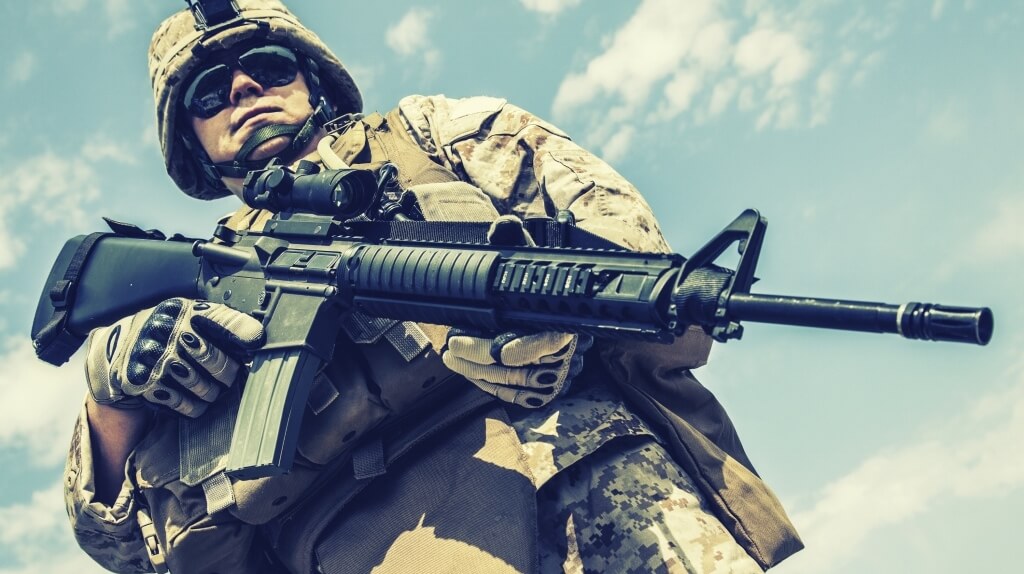The former head of intelligence at the Royal Marines explains how firms can adapt their strategy post-COVID to mitigate future risks.
How You Can Use Military Precision To Navigate Business During COVID?
The former head of intelligence at the Royal Marines explains how firms can adapt their strategy post-COVID to mitigate future risks.

The physical hardship, austere conditions and deafening noise of combat is a long way from the sharp suits and lattes of the city, but there are numerous parallels that the military - in my case, the 14 years serving as a Royal Marines Officer - share with the world of business.
I work with many different companies across a range of sectors in partnership with ‘The Future Strategy Club’, to cross-pollinate some of the lessons and experiences between these two very worlds.
I’m continually struck by the parallels between the challenges of business with those we faced on combat operations. Perhaps now as the country and, indeed, the world begins to come to terms with the realities of a post-COVID economy, the hard-fought lessons of military operations may be of value.
There are a huge number of parallels which can be brought across from the military world into the world of business. For this, I think it is important to understand where the two worlds are different and to then figure out where they come together.
Ultimately, the modern business world is built from structures born from the industrial era, meaning firms aim to outdo competitors in efficiency, speed and price. There are lessons to be learned from the military, who have thousands of years of experience in structuring people.
In complex times especially, both businesses and militaries learn lessons in a more organic way - but often the military is a couple of steps ahead. The military learns things the hard way, from the attrition of warfare, which are then translated and applied to business.
This can even be seen in the language that is used in the professional world where we are starting to talk about ‘insurgent’ start-up companies and ‘asymmetric’ marketing campaigns.
For me, it's really important that we bring across the right lessons. There are some things that the military does really well that the commercial sector can learn from; and then there are also things that the military does quite terribly, which they need to learn from the commercial sector.
At the moment, I think there are key lessons in routinely managing teams in uncertain situations. This is something that is quite new in the commercial world, but that happens day in, day out in the military.
It will come as no surprise that the military can be quite adept at managing immediate physical risk. After all, threats to life are an occupational hazard. But, if not managed appropriately by any large bureaucratic organisation, longer-term risk can quickly paralyse decision-making.
When there is an enduring possibility of facing a life-threatening or dangerous situation, Marines needed to be able compartmentalise the danger faced, from the skills and tactics needed to mitigate the risks.
This was done in part through comprehensive training to recognise and deal with the threat they face. It was also achieved by being part of a high-performing team, giving serving men and women the confidence to face uncertainty and threats together.
Business leaders, in a similar manner, should focus on mitigating these risks and finding workable solutions around them, rather than obsessing over them.
When it comes to real-world examples such as returning to a city-centred office, managers and leaders will need to give their teams the tools and training they require to acknowledge, deal with and mitigate the risk of returning to densely populated spaces.
The risks should be clear to workers and, post-COVID, it will be important that firms have a culture that is upfront and acknowledges the possibility that things may go wrong, whether financially, health-wise or otherwise.
In a time of increased uncertainty, the natural instinct as a leader is to hold on tighter, to reign in others and try to retain control of things within your grasp. They need to do the opposite.
Business leaders should focus on empowering their employees to make informed decisions, by delegating authority (whilst retaining responsibility), increasing communication flows and forming high-performing teams that work together and depend on each other to overcome challenges.
Although, decision makers should be aware that the key lessons we need to take away from this is not ‘how to deal with pandemics’; it’s how to be prepared for uncertainty and dynamic change.
Businesses need to understand that shocks, in general, happen and not that one particular type of shock – such as a second wave of Coronavirus - may happen.
Strategists should be learning lessons about supply chain disruption, rapidly evolving government policy and the impact of huge shifts social attitudes; not focusing on hand sanitiser and Perspex shields. This is the difference between tactics and strategy.
In normal life, it becomes comfortable for leaders to use data to plan, but in complexity, no one can be omnipotent about what will happen. I would suggest looking at the scope of possibility and from there devising a range of best case to worst case scenarios and plan for these.
This, in turn, will create the confidence for teams to talk about what they would do in these hypothetical situations, without having to deal with the baggage and stress that would come from actually being in these situations.
If you have some ideas on what you would do, it becomes easier to deal with change and to compartmentalise when change inevitably comes to fruition.
If the Coronavirus pandemic has taught firms anything, it should be that no business is too large or too small to withstand the impact of cyclical economic shocks.
A lot of people, especially those who have built new businesses, never really felt that resilience planning, risk management or disruption planning was an important aspect of their business model - but COVID has brought the importance of this into the spotlight.
Gareth Tennant is the former Head of Intelligence at the Royal Marines. He now works as a member for the FSC, a lean and transparent agency of the best freelance talent in the UK.
Thanks for signing up to Minutehack alerts.
Brilliant editorials heading your way soon.
Okay, Thanks!

